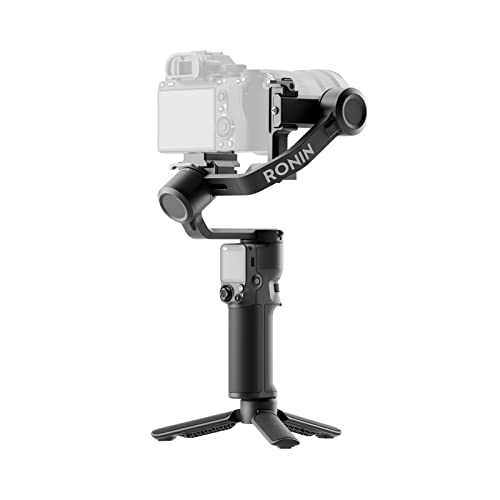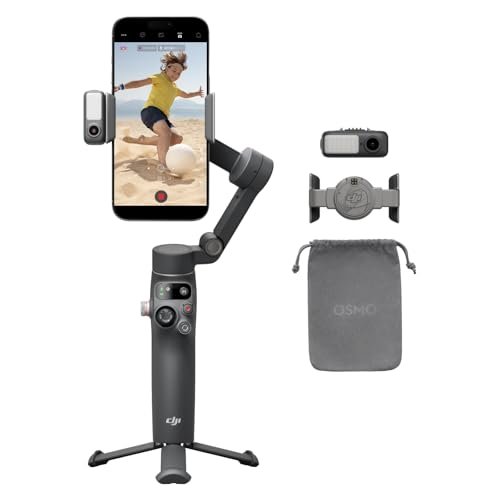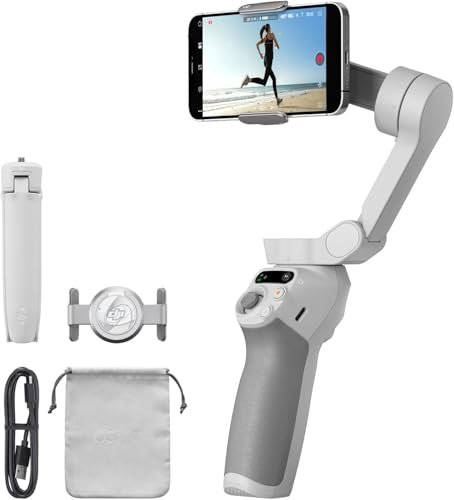So, you’ve got a Canon EOS 70D, and you’re looking to step up your video game, right? While your 70D is a fantastic camera, especially with its Dual Pixel CMOS AF for video, handheld footage can often look a bit shaky. That’s where a good gimbal comes in. Finding the best gimbal for Canon 70d can totally change your videography game, turning choppy clips into smooth, professional-looking cinematic sequences.
A camera stabilizer or gimbal is an essential tool for filmmakers, vloggers, and anyone serious about getting silky-smooth shots. It counteracts unwanted camera movements, giving your videos that polished, effortless glide. But it’s not just about stabilization; a good setup includes understanding your camera and other useful accessories.
In this guide, we’ll dive deep into some top picks for gimbals that pair well with your Canon 70D, along with a look at other important gear that can elevate your filming experience. We’ve rounded up a mix of powerful stabilizers and other handy tools to help you get the most out of your Canon 70D.
Why a Gimbal for Your Canon 70D?
The Canon 70D, while a DSLR, boasts excellent video capabilities thanks to its articulating touchscreen and responsive autofocus in Live View. However, its larger size compared to smaller mirrorless cameras means handheld shooting can easily introduce jitters. A quality 3-axis gimbal eliminates this shake, allowing for dynamic tracking shots, smooth pans, and stable walking footage, transforming your video quality from amateur to pro-level.
Top Gimbals for Your Canon 70D
Here are our top gimbal recommendations that offer great compatibility and performance with your Canon 70D, providing that much-needed camera stabilization.
DJI RS 3 Mini, 3-Axis Gimbal Stabilizer for Cameras

The DJI RS 3 Mini is a fantastic choice for Canon 70D users looking for portability without sacrificing performance. This ultra-compact gimbal stabilizer punches above its weight, making it incredibly convenient for travel and extended shooting sessions. Despite its small stature, it boasts strong, high-torque motors, easily handling the Canon 70D and a range of popular lenses. Its intuitive design and intelligent features make getting smooth, cinematic shots surprisingly easy, even for beginners.
Key Features:
– 795g (1.75lbs) Lightweight and Portable
– Wide-Ranging Compatibility with up to 2 kg (4.4 lbs) payload capacity
– Bluetooth Shutter Control for easy photo and video recording
– 3rd-Gen RS Stabilization Algorithm for pro-level stability
– Native Vertical Shooting for social media content
– 1.4″ Full-Color Touchscreen with intuitive UI design
– Requires DJI Ronin app for activation and full functionality
Pros:
– Extremely lightweight and travel-friendly
– Excellent stabilization capabilities
– Quick and easy setup with Bluetooth control
– Versatile for both horizontal and vertical shooting
– User-friendly touchscreen interface
Cons:
– Payload might be limiting for heavier lenses
– Requires app for full functionality, which might be an extra step for some
User Impressions: Users often praise the RS 3 Mini for its impressive stabilization given its size and weight. Many find it incredibly convenient for vlogging and run-and-gun shooting, especially with DSLRs like the 70D, noting how it simplifies the process of achieving smooth, professional-looking video.
DJI RS 4 Mini, Gimbal Stabilizer for Cameras

Stepping up from its predecessor, the DJI RS 4 Mini brings even more refined features to the table, making it a stellar option for your Canon 70D. Its standout “Ready in 1s” auto axis locks mean you’re always prepared to capture those spontaneous moments without fumbling with manual adjustments. This camera gimbal stabilizer is built for speed and adaptability, featuring intelligent tracking and an enhanced balancing system that ensures your Canon 70D is always perfectly steady, even during the most dynamic scenes. If you’re often on the move and need a responsive, efficient stabilizer, the RS 4 Mini truly shines.
Key Features:
– Ready in 1 s with auto axis locks
– Intelligent Tracking Module for precise subject framing
– Teflon Enhanced Balancing for smoother adjustments
– Fast Vertical Switch in 10 seconds for mobile-friendly content
– Responsive Follow Mode for instant reaction to hand movements
– Supports up to 2kg/4.4lbs payload, ideal for mirrorless, DSLR (like 70D), and vlog cams
– Starter kit includes gimbal, tripod, and essential accessories
Pros:
– Super fast setup with auto locks
– Excellent for dynamic and fast-paced shooting
– Enhanced balancing system is a big plus
– Seamless vertical shooting
– Strong payload capacity for the 70D and various lenses
Cons:
– DJI Ronin app might require downloading from DJI’s official site for Android users due to platform issues
– Intelligent tracking module might be an added cost/complexity for some
User Impressions: Reviewers rave about the RS 4 Mini’s speed and intelligent features. Many appreciate the auto-locking mechanism, saying it saves valuable time on set. The smooth tracking and responsiveness are frequently highlighted as game-changers for solo shooters trying to capture dynamic action with their Canon 70D.
ZHIYUN CINEPEER WEEBILL 3E 3-Axis Gimbal Stabilizer for…

The ZHIYUN CINEPEER WEEBILL 3E is designed for creators who demand efficiency and comfort, making it a strong contender for the best gimbal for Canon 70D. What truly sets this gimbal apart is its incredibly comfortable and ergonomic design, which can be further enhanced with optional accessories like the wrist rest and sling handle to reduce physical fatigue by over 50%. It also boasts native vertical shooting without needing extra accessories, perfect for modern content creation. Its robust 3kg payload capacity means your Canon 70D, even with a heavier lens, will feel right at home.
Key Features:
– Native Vertical Shooting with quick-mount system
– Bluetooth Shutter Control for wireless camera operation
– Built-in 2600mAh batteries with 14W fast charging (2h 46m charge time)
– 2.5 Sling Mode for reduced physical fatigue (grip and wrist rest sold separately)
– Compact (A4-sized) and lightweight (1.05 kg)
– Strong 3kg (6.6 lbs) payload capacity
– Includes paper-based manuals for clear guidance
Pros:
– Superior ergonomic design for comfortable, long-term shooting
– High payload capacity for versatile camera/lens combos
– Efficient native vertical shooting
– Convenient Bluetooth control
– Excellent battery life with fast charging
Cons:
– Sling mode accessories are separate purchases
– May be slightly larger than mini gimbals, though still portable
User Impressions: Users consistently praise the Weebill 3E for its ergonomic design, especially during extended shoots, citing significant reductions in arm fatigue. The native vertical shooting is also a major hit for social media content creators, while its robust build quality inspires confidence when mounting valuable gear like the Canon 70D.
FeiyuTech SCORP-C [Official] Camera Stabilizer 3-Axis…
![FeiyuTech SCORP-C [Official] Camera Stabilizer 3-Axis...](https://m.media-amazon.com/images/I/41cuk84JumL._SL500_.jpg)
For those looking for a versatile and robust camera stabilizer, the FeiyuTech SCORP-C is an excellent choice for your Canon 70D setup. This upgraded version of the popular AK2000C offers an enhanced payload capacity, comfortably handling a wider range of DSLR and mirrorless camera and lens combinations. What truly makes the SCORP-C stand out is its integrated handle grip, which provides a more stable and comfortable shooting experience right out of the box. Its multi-functional knob ring allows for intuitive control over camera focus and gimbal axis, putting creative power at your fingertips.
Key Features:
– Compatible with mainstream mirrorless and DSLR camera & lens combos
– Upgraded payload to 5.51 lbs (2.5 kg)
– Integrated handle grip for enhanced stability and comfort
– Multi-Functional Knob Ring to control camera focus and gimbal axis
– Wide camera model compatibility including Canon, Nikon, Panasonic, Fujifilm, and Sony (check specific list)
Pros:
– Higher payload capacity suits many Canon 70D setups
– Integrated handle improves ergonomics and ease of use
– Intuitive control with the multi-functional knob
– Strong build quality for reliable performance
– Good value for its feature set
Cons:
– May be slightly heavier than the “mini” gimbals
– Extensive camera compatibility list needs checking for specific models/lenses
User Impressions: Customers frequently highlight the SCORP-C’s solid build and comfortable integrated grip as major advantages. Its upgraded payload capacity is appreciated by users with heavier DSLR setups, and the intuitive controls make it easy to adapt to different shooting scenarios, especially for smooth video production with cameras like the Canon 70D.
Beyond Stabilization: Essential Companions for Your Canon 70D
While the primary focus of this article is finding the best gimbal for Canon 70D, a complete videography kit involves more than just a stabilizer. Here are some other products that, while not gimbals themselves, are highly relevant and useful for any Canon 70D owner looking to enhance their creative output.
Canon EOS 70D Digital SLR Camera (Body Only)

This isn’t a gimbal, but it’s the star of the show! The Canon EOS 70D is a powerhouse DSLR that remains a popular choice for aspiring filmmakers and photographers. Its 20.2 MP APS-C CMOS sensor paired with the DIGIC 5+ processor delivers excellent image quality, but it’s the Dual Pixel CMOS AF system that really shines for video, offering remarkably fast and smooth autofocus in live view. This makes it an ideal companion for any gimbal, ensuring your subjects stay sharp even when you’re moving. The articulating touchscreen and built-in Wi-Fi further enhance its usability for various shooting scenarios, including vlogging.
Key Features:
– 20.2 MP APS-C CMOS sensor and DIGIC 5+ processor
– 19-point cross-type AF System
– Dual Pixel CMOS AF for fast focus in live view and video
– 3-inch articulating touch panel LCD screen
– Built-in Wi-Fi and EOS Remote app for instant sharing and remote control
– Full HD 1080p video recording at various frame rates
Pros:
– Excellent video autofocus (Dual Pixel CMOS AF)
– Articulating touchscreen is great for vlogging and difficult angles
– Solid image quality for both photos and video
– Built-in Wi-Fi is convenient
– Robust and reliable build
Cons:
– Heavier than mirrorless cameras
– Older model, so lacks some modern features like 4K video
User Impressions: Owners consistently praise the 70D for its reliable autofocus, especially for video. The articulating screen is a massive hit for self-shooting and creative angles, making it a very user-friendly DSLR despite its age. It’s a solid workhorse for anyone wanting to learn video production.
58MM 0.43x Altura Photo Professional HD Wide Angle Lens…

This is a lens attachment, not a gimbal. However, for Canon 70D users, especially those shooting video, a wide-angle lens can be incredibly useful. This Altura Photo attachment easily screws onto the front of your existing 58mm lens (like the popular Canon EF-S 18-55mm kit lens), instantly expanding your field of view. This is perfect for capturing expansive landscapes, fitting more into the frame when vlogging, or getting those dynamic, immersive shots. It also includes a detachable macro lens for stunning close-ups, adding to its versatility. Just remember to check your lens’s thread size before ordering!
Key Features:
– Easily screws on to the front of 58mm lenses
– Instantly expands field of view for wide-angle photography
– Detachable macro lens for high-resolution close-ups
– Compatible with popular 58MM Canon, Nikon, Olympus, Panasonic, Fujifilm lenses
Pros:
– Affordable way to get wide-angle capabilities
– Includes macro functionality
– Easy to attach and remove
– Good for vlogging and landscape shots
Cons:
– Not a standalone lens; requires an existing 58mm lens
– Can introduce some image distortion or softness, typical for attachments
User Impressions: Many users find this a budget-friendly solution to add wide-angle capabilities to their kit lenses, especially for casual videography and vlogging. The macro feature is often cited as a pleasant bonus, offering more creative options for Canon 70D owners.
Canon EOS 70D For Dummies

Again, this isn’t a gimbal, but it’s an incredibly valuable resource for any Canon 70D owner! Whether you’re a beginner or just looking to unlock more features of your camera, a “For Dummies” guide can be a lifesaver. It simplifies complex camera functions into easy-to-understand language, helping you master everything from basic settings to advanced photography and videography techniques. While it won’t stabilize your footage, knowing your camera inside and out will help you maximize the benefits of a gimbal and achieve better results overall.
Key Features:
– Comprehensive guide to the Canon EOS 70D
– Explains camera functions and settings in simple English
– Covers both photography and video aspects
– Ideal for beginners and those looking to deepen their understanding
Pros:
– Easy to understand and follow
– Helps unlock the full potential of your 70D
– Great for learning camera basics and advanced techniques
– A valuable reference tool
Cons:
– Not a physical piece of gear
– Information might be available online, but in a less structured format
User Impressions: Users universally praise “For Dummies” books for their clarity and approachability. Many 70D owners found this book invaluable for navigating their camera’s menus, understanding exposure, and getting a grasp on video settings, saying it quickly improved their shooting skills.
Factors to Consider When Choosing a Gimbal for Canon 70D
When you’re looking for the best gimbal for Canon 70D, several factors come into play beyond just stabilization:
- Payload Capacity: Your Canon 70D isn’t the lightest camera, especially once you add a lens. Ensure the gimbal’s maximum payload capacity can comfortably handle your camera-lens combination. Always check your setup’s total weight.
- Battery Life: Longer battery life means more shooting time. Look for gimbals with good battery endurance and fast charging capabilities.
- Ease of Balancing: A well-balanced gimbal performs best. Look for models with quick-release plates and clear markings that make balancing your Canon 70D straightforward.
- Portability & Weight: Will you be carrying it around all day? A lighter, more compact gimbal is always a plus, especially if you’re traveling or vlogging.
- Features & Modes: Consider features like native vertical shooting, intelligent tracking, various follow modes, and a dedicated app for advanced control.
- Build Quality: A durable gimbal made from quality materials will withstand the rigors of regular use.
- Price: Gimbals range widely in price. Determine your budget and look for the best features within that range.
FAQ Section
Q1: Can the Canon 70D be used on a gimbal?
A1: Absolutely! The Canon 70D is a great candidate for a gimbal, especially for video. Its Dual Pixel CMOS AF system makes it excellent for continuous autofocus, and a gimbal enhances this by providing super smooth, stable footage, eliminating handheld shake.
Q2: What is the maximum payload capacity I need for my Canon 70D?
A2: The Canon 70D body weighs approximately 755g (1.66 lbs). Add a standard kit lens (e.g., 18-55mm, around 200g/0.44 lbs) and you’re looking at about 955g (2.1 lbs). To be safe and accommodate larger lenses, look for gimbals with a payload capacity of at least 2 kg (4.4 lbs) or more.
Q3: Are mirrorless gimbals compatible with DSLRs like the Canon 70D?
A3: Many modern gimbals are designed to be “universal” for both mirrorless and DSLR cameras, provided the camera falls within their specified payload capacity. Always double-check the gimbal’s compatibility list and weight limits to ensure your Canon 70D and chosen lens will work.
Q4: How important is battery life for a gimbal?
A4: Very important! Good battery life ensures you won’t run out of power in the middle of a shoot. Look for gimbals that offer 10-14 hours of operation, and ideally, support fast charging or allow for external power banks.
Q5: What’s the benefit of native vertical shooting on a gimbal?
A5: Native vertical shooting allows you to quickly switch your camera’s orientation for content specifically designed for social media platforms like TikTok, Instagram Reels, or YouTube Shorts. It saves you from complex post-production rotation and maintains optimal quality.
Q6: Do I need a specific app to control my gimbal?
A6: Most advanced gimbals come with a dedicated smartphone app that allows for fine-tuning settings, controlling modes, firmware updates, and sometimes even intelligent features like object tracking. While not always strictly necessary for basic operation, the app significantly enhances the gimbal’s functionality.
Q7: Is it hard to balance a Canon 70D on a gimbal?
A7: Balancing can seem daunting at first, but with practice, it becomes quicker. Gimbals usually have clear guides and quick-release plates to help. The Canon 70D’s size means precise balancing is key, but once you get the hang of it, it’s fairly straightforward.
Conclusion
Choosing the best gimbal for Canon 70D (and rounding out your kit with other essential gear) doesn’t have to be a headache. Whether you prioritize portability, advanced features, or ergonomic comfort, there’s a fantastic option out there for your Canon 70D. Remember to consider payload capacity, battery life, and ease of use to ensure you pick the perfect stabilizer for your needs. Armed with the right information, choosing the best gimbal for Canon 70D (and other gear) becomes a much simpler task, paving the way for incredibly smooth, professional-looking videos. Happy shooting!


